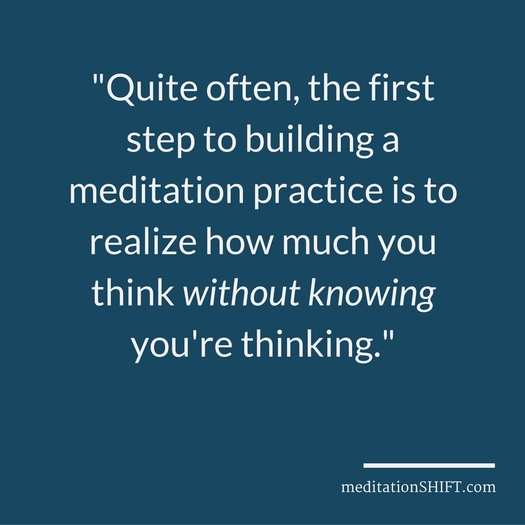|
note: we link to our free guide to mindfulness and meditation at the bottom of the page (no email required). We all face challenges when developing a meditation practice. One of the most common is believing that meditating produces more thoughts. This isn't true, it's simply part of the path for many people. Most of us go through our days lost in thought without knowing we're lost in thought. When we finally make the focused effort to look, we discover how compulsive our minds are (and, how the non-stop mental noise colors the background of our existence). Here's an example for someone we'll call Bill: 1.) Bill starts meditating, and he believes it's going great. The first few times he does it, he's convinced that he's able to stop thoughts and "quiet" his mind. "This meditation thing is really cool...and, I'm good at it. I'm so Zen!" 2.) After a few sessions, Bill becomes frustrated because he now feels he's bombarded with thoughts (and emotions, and urges, and sensations...). Why is this happening? A few days ago, he could sit and not think at all. Now, he can't stop thinking. "Meditating is actually making things worse." 3.) Bill grows more frustrated and eventually stops meditating. "It didn't work for me - it did the opposite of what it was supposed to do." Of course, meditating isn't making things worse - and, it isn't creating more thoughts. Bill is simply becoming aware of what has always been there. He is becoming aware of his compulsive mind, and the thoughts, emotions, urges, sensations, and perceptions that permeate his daily life. He is seeing clearly - perhaps for the first time - an inner narrative that comments on and judges everything (including himself!). This can be a frightening experience for many of us - as we wrote in "An owner's guide to the mind," "For many, it's comparable to believing they are alone in an empty stadium but finding they are actually surrounded by a hundred thousand screaming (most likely angry) fans." We have to remember there are steps in every meditation practice. And, quite often, the first step is to realize the nature of the mind. And, part of this realization is accepting that you've been oblivious to it most of your life - that you've been lost in thought without knowing you're lost in thought. Once you complete this first step, you may come to the conclusion that "my mind is too busy to meditate." This is also a common starting point for those who already know how compulsive their minds are, and have rationalized not meditating because they believe they are different; they believe their minds are unique, and meditation simply won't work for them. Of course, this isn't true either. And one of our most popular articles addresses this misconception: "My mind is too busy to meditate!" Stop dealing with the symptoms.Stress, anxiety, self-confidence issues, the inability to stop bad habits, problems with sleep and focus, and on and on and on.
These and the other things we struggle with every day are only symptoms. The good news is, they all share the same root cause. The bad news is, if you don't address that root cause, the symptoms will keep coming back no matter what you do. That's why we wrote "An owner's guide to the mind." For almost 20 years, people have been using it to address the root cause of their daily struggles. Click here to view the contents and learn more. Comments are closed.
|
